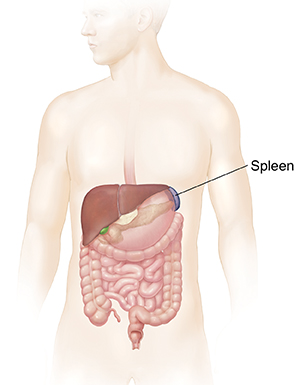A bruise (contusion) is a type of injury. It occurs when small blood vessels break open and leak blood into nearby tissues. The spleen is a small organ located in the upper left part of the belly (abdomen). The main role of the spleen is to filter your blood. It sits under the left ribs in front of the stomach. It can become bruised after an injury to the area.
What causes a bruised spleen?
The spleen can become bruised from:
-
A car accident.
-
Direct blows to the belly. This may happen while playing a sport or in a physical fight.
-
A fall that injures the belly.
Symptoms of a bruised spleen
You may feel pain and soreness in the upper left part of your belly. You may also feel pain in the left side of your chest, under your left ribs, or in your left shoulder. In some cases, you may have bruised skin over the injured area. Your belly may swell. In severe cases, you may have signs of shock. These include changes in alertness and low blood pressure.
Treatment of a bruised spleen
Treatment for a bruised spleen depends on how severe the injury is. Patients who are stable and have no evidence of ongoing blood loss may not need surgery. But you may still need:
-
Close monitoring in the hospital.
-
Bed rest and IV (intravenous) fluids.
-
Tests to check for blood loss and other injuries.
-
Imaging tests such as a CT scan to look at the internal organs.
For a minor bruise
If the bruise is minor with no signs of blood loss, you may be sent home from the hospital after several days. Home care may involve further rest. You may also need to stop some activities until your spleen heals. You may need follow-up care with your health care provider.
For a severe case
In severe cases, or if tests show blood loss or other injuries, you will likely need a procedure or surgery. This may be used to:
-
Drain excess fluids or blood from the belly.
-
Find and stop the source of bleeding in the spleen or belly.
-
Remove the spleen and repair other injuries as needed.
Possible complications of a bruised spleen
Complications may include:
-
Severe blood loss, which can lead to shock.
-
Burst (ruptured) spleen.
-
Infection.
-
Death.
Call 911
Call
-
Pale skin.
-
Rapid pulse.
-
Shallow breathing.
-
Dizziness.
-
Fainting.
-
Confusion.
When to call your health care provider
Call your doctor right away if:
-
You have a fever of 100.4°F (38°C) or higher, or as directed by your doctor.
-
You have chills.
-
Your symptoms don’t get better with treatment, or get worse.
-
New symptoms appear.
Author: Yang, Sue
© 2000-2025 The StayWell Company, LLC. All rights reserved. This information is not intended as a substitute for professional medical care. Always follow your healthcare professional's instructions.

